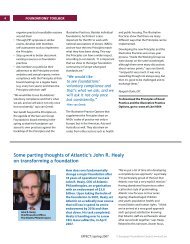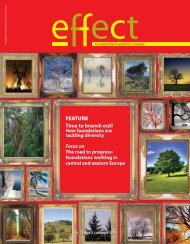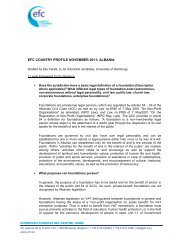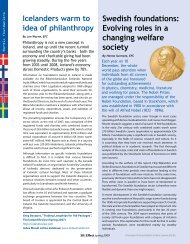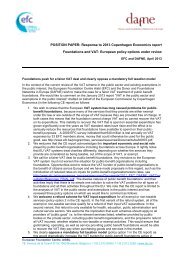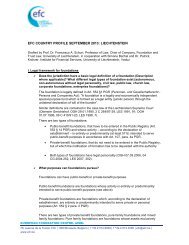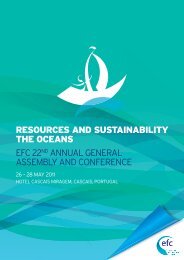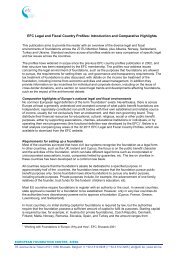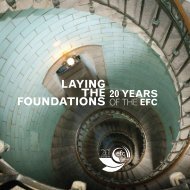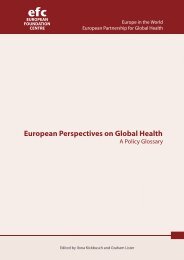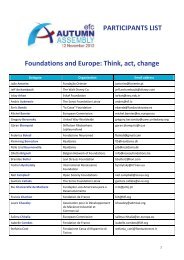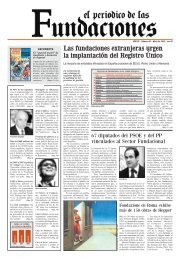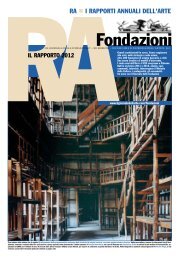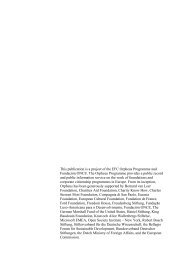2008 - The European Foundation Centre
2008 - The European Foundation Centre
2008 - The European Foundation Centre
You also want an ePaper? Increase the reach of your titles
YUMPU automatically turns print PDFs into web optimized ePapers that Google loves.
<strong>European</strong> <strong>Foundation</strong> <strong>Centre</strong><br />
<strong>2008</strong> Annual Report and<br />
Financial Statement
Copyright © <strong>European</strong> <strong>Foundation</strong> <strong>Centre</strong> (EFC) 2009<br />
All rights reserved. Reproduction by any means mechanical or electronic is prohibited without express written consent of the publisher.<br />
Quotation from this publication is authorised subject to full identification of source. EFC shall not be held liable for errors and/or omissions,<br />
nor shall any statement in this publication be construed as a recommendation to third parties<br />
Photo credits<br />
<strong>The</strong> photos on the front cover and pages 4, 6, 7, 10, 11, 15, and 17 were submitted in the framework of the <strong>2008</strong> EFC Photo Competition<br />
Cover photo © Tadeusz Mirosz, <strong>The</strong> Kronenberg <strong>Foundation</strong><br />
Page 3 © Ana Baião<br />
Page 4 © Jasmin Borgenheimer, Freudenberg Stiftung<br />
Page 6 © David Ausserhofer, Körber-Stiftung<br />
Page 7 © Moreno Carbone, Fondazione Carispe<br />
Page 8 © Fondazione Cariplo<br />
Page 10 © Francesco Acerbis, Fondation de France<br />
Page 11 © T. Predescu, King Baudouin <strong>Foundation</strong><br />
Pages 12 and 25 © Levent Kulu<br />
Page 15 © Christoph Blüthner, Freudenberg Stiftung<br />
Page 17 © Peter de Ruiter, Bernard van Leer <strong>Foundation</strong><br />
For additional copies of this publication and further information on EFC, please contact:<br />
<strong>European</strong> <strong>Foundation</strong> <strong>Centre</strong>, AISBL<br />
51-53, rue de la Concorde | 1050 Brussels, Belgium<br />
t +32.2.512.8938 | f +32.2.512.3265 | efc@efc.be | www.efc.be<br />
<strong>European</strong> <strong>Foundation</strong> <strong>Centre</strong><br />
<strong>2008</strong> Annual Report and Financial Statement
<strong>European</strong> <strong>Foundation</strong> <strong>Centre</strong><br />
<strong>2008</strong> Annual Report and Financial Statement
© Ana Baião<br />
Holding a Steady Course<br />
<strong>2008</strong> was indeed an eventful year.<br />
My first year as Chair of the <strong>European</strong><br />
<strong>Foundation</strong> <strong>Centre</strong> (EFC) has<br />
witnessed crises, successes, setbacks<br />
and opportunities for the EFC, the<br />
philanthropic sector as a whole and<br />
the world at large.<br />
One key event for foundations was<br />
the submission to the <strong>European</strong><br />
Commission of the feasibility study on<br />
a <strong>European</strong> <strong>Foundation</strong> Statute (EFS).<br />
In an enlarged and growing <strong>European</strong> Union, it is of paramount importance<br />
that public-benefit foundations should have the possibility to make use of<br />
a legal form that allows them to pursue and expand their activities across<br />
the whole continent. <strong>The</strong> EFC Legal Committee and Advocacy Task Force<br />
have done an excellent job monitoring the development of the feasibility<br />
study and stepping-up the EFC’s advocacy work in relation to the Statute.<br />
EFC’s membership has continued to grow and now stands at 231 voting<br />
members, from 40 different countries. In these times of financial<br />
uncertainty, we are counting on our members to maintain their support<br />
for the EFC, thereby allowing us to continue developing our broad range<br />
of activities and services.<br />
As in previous years, the highlight of the EFC calendar was the Annual<br />
General Assembly and Conference, for which a record number of<br />
participants gathered in the magnificent city of Istanbul. Bringing together<br />
funders from across the world under the theme of “Fostering Creativity”, it<br />
was fitting that Istanbul, the crossroads of East and West, should host this<br />
event.<br />
Effect magazine continues to tell the stories of foundations and the work<br />
they undertake. Meanwhile, David Carrington’s report “Building Talent and<br />
Excellence within <strong>Foundation</strong>s” provides a valuable starting point for the<br />
EFC to support its members through the development of capacity-building<br />
activities at the <strong>European</strong> level. Regional and thematic networks have also<br />
continued to flourish under the coordination of the EFC secretariat, to<br />
whom I offer my gratitude for all their hard work over the past year.<br />
<strong>The</strong> end of <strong>2008</strong> was, of course, overshadowed by the global financial<br />
crisis, and marked the beginning of what will be an extremely difficult<br />
time for foundations. An EFC survey revealed that although the majority<br />
of respondents should still be able to meet all grantmaking programme<br />
commitments in 2009, nearly half expect their foundations’ budget for<br />
grantmaking and/or operating programmes to decrease in the next<br />
two years. A trying time indeed, but all the more reason for <strong>European</strong><br />
foundations to come together as a way to weather the storm. As we say in<br />
Portugal: A união faz a força (Unity makes strength).<br />
I hope you will enjoy reading the highlights of the EFC’s activities over the<br />
following pages.<br />
Emílio Rui Vilar,<br />
Chair, <strong>European</strong> <strong>Foundation</strong> <strong>Centre</strong><br />
President, Fundação Calouste Gulbenkian
5<br />
9<br />
12<br />
14<br />
18<br />
23<br />
25<br />
CONTENTS<br />
Improving laws and taxes<br />
Telling the story of<br />
<strong>European</strong> philanthropy<br />
Benchmarking and capacity-building<br />
Network-building<br />
Financial Statement <strong>2008</strong><br />
Membership <strong>2008</strong><br />
Governing Council<br />
© Jasmin Borgenheimer, Freudenberg Stiftung
Improving laws and taxes<br />
One of the <strong>European</strong> <strong>Foundation</strong> <strong>Centre</strong>’s main priorities is to represent its members and engage in dialogue<br />
with the institutions of the <strong>European</strong> Union, in order to bring about a positive legal and fiscal environment<br />
for public-benefit foundations and other independent funders. <strong>The</strong> EFC also supports its members’ lobbying<br />
efforts at national level, with the aim of ensuring fair treatment of foundations and encouraging the growth<br />
of philanthropic activity throughout Europe and the world.<br />
WORk ON lEgAl ANd FISCAl ISSuES<br />
<strong>European</strong> foundation statute<br />
<strong>2008</strong> was a year of progress along the path towards the creation of a<br />
<strong>European</strong> <strong>Foundation</strong> Statute, which is a long-standing objective of<br />
the EFC. Two German Research Institutes, the Max Planck Institute for<br />
International Private Law (MPI) and the <strong>Centre</strong> for Social Investment<br />
at the University of Heidelberg (CSI) completed the feasibility study<br />
on a <strong>European</strong> <strong>Foundation</strong> Statute and submitted it to the <strong>European</strong><br />
Commission in December <strong>2008</strong>. <strong>The</strong> study, which examined the need<br />
for and feasibility of a new <strong>European</strong> legal form for foundations, will<br />
be made public in 2009. Initial outcomes indicated that the <strong>European</strong><br />
foundation sector is larger than previously thought, and carries out<br />
extensive cross-border activities which are hampered by significant<br />
legal, fiscal and administrative barriers.<br />
<strong>The</strong> EFC Legal Committee and Advocacy Task Force monitored the<br />
development of the Feasibility Study and stepped-up advocacy<br />
work on the Statute. An EFC delegation met officials of the <strong>European</strong><br />
Commission Directorate-General for Internal Market and Services on<br />
31 March to press the case for a <strong>European</strong> <strong>Foundation</strong> Statute and<br />
asked the Commission to submit a legislative proposal to the Council<br />
and Parliament no later than 2010. <strong>The</strong> <strong>Centre</strong> also discussed the need<br />
for a Statute with Members of the <strong>European</strong> Parliament, at an event<br />
organised in cooperation with Manuel Medina Ortega MEP on 17<br />
September. A Frequently Asked Questions (FAQ) document, which<br />
aims to address both misconceptions and reservations about what a<br />
<strong>European</strong> <strong>Foundation</strong> Statute could help to achieve, was published in<br />
July. <strong>The</strong> EFC has also contributed at various other EU-level and national<br />
meetings regarding the need for a Statute.<br />
www.efc.be/projects/eu/legal/efcefs.htm<br />
EFC <strong>2008</strong> Annual Report and Financial Statement | 5
National foundation law developments<br />
In October, the Bulgarian Ministry of Finance issued a legislative proposal<br />
which would cut off incentives for donations and legacies to most publicbenefit<br />
organisations. <strong>The</strong> EFC also learned that the German government<br />
had issued a legislative proposal which would mean that to qualify for<br />
tax exemptions, German and foreign-based organisations would have<br />
to support the ’general public’ by either helping people residing in<br />
Germany or by pursuing activities which benefit Germany’s international<br />
reputation. <strong>The</strong> EFC reacted immediately by issuing statements on<br />
both matters in cooperation with the national associations of donors in<br />
both countries, and has since learned that the Bulgarian proposal has<br />
been withdrawn. Meanwhile, the German law was adopted with less<br />
restrictive language which states that an organisation may benefit from<br />
tax-exemptions if the activities being carried out have a possibility of<br />
improving Germany’s international reputation.<br />
www.efc.be/projects/eu/legal/<br />
Value Added Tax (VAT) and public-benefit<br />
foundations<br />
<strong>The</strong> EFC has long been concerned that public-benefit foundations are<br />
treated unfairly by the current VAT system. <strong>Foundation</strong>s are considered<br />
to be the final consumer, with no possibility of reclaiming VAT, while<br />
commercial companies may pass on the cost of VAT when they sell their<br />
products or services. In <strong>2008</strong>, the EFC’s Legal Committee put together<br />
an information note on VAT together with the Donors and <strong>Foundation</strong>s<br />
Networks in Europe (DAFNE) and the <strong>European</strong> Charities’ Committee<br />
on VAT (ECCVAT), and launched a survey among the EFC membership<br />
in order to get a better idea of how much is lost on VAT and how the<br />
situation could be improved. Some 30 EFC members reported that they<br />
are losing significant amounts of money (on average, around €1 million<br />
per foundation per year) on VAT payments which cannot be claimed<br />
back. This work will feed into an upcoming EU consultation on the<br />
VAT treatment and taxation of public bodies and the future of social<br />
exemptions.<br />
6 | EFC <strong>2008</strong> Annual Report and Financial Statement<br />
Updated legal and fiscal country profiles<br />
In <strong>2008</strong>, the EFC updated and extended the legal and fiscal country<br />
profiles on foundations’ operating environments in the EU, following<br />
the previous country profile publication in 2007. <strong>The</strong> extended profiles<br />
now include more information on how the concept of ‘public-benefit’ is<br />
defined in the various Member States of the <strong>European</strong> Union.<br />
www.efc.be/projects/eu/legal/country_profiles.asp<br />
© David Ausserhofer, Körber-Stiftung
RElATIONS WITH THE Eu INSTITuTIONS<br />
Shaping EU debate on foundations’<br />
transparency and accountability<br />
<strong>The</strong> EFC actively monitored the <strong>European</strong> Commission’s reflection on<br />
the accountability and transparency of foundations, which took place<br />
in the context of EU work on the prevention of financing criminal and<br />
terrorist activities. <strong>The</strong> EFC’s efforts aimed to ensure that any EU-level<br />
response and possible measures are proportionate and do not ‘overburden’<br />
foundations with costly compliance procedures and undermine<br />
or discourage legitimate international activities.<br />
<strong>The</strong> EFC provided input into two studies commissioned by the <strong>European</strong><br />
Commission (EC): on the alleged abuse of Non-Profit Organisations<br />
(NPOs) for terrorist financing; and on public and self-regulatory<br />
initiatives to improve the transparency and accountability of NPOs in<br />
the EU. <strong>The</strong>se studies aimed at identifying good practices and setting<br />
out recommendations to address shortcomings through regulatory and<br />
other means at national and <strong>European</strong> levels. <strong>The</strong> EFC also took part in<br />
the Commission’s “experts meetings”, which gathered representatives<br />
of <strong>European</strong> NPO umbrella organisations, Member States and oversight<br />
organisations – thereby ensuring that EFC members’ concerns and<br />
views were taken into consideration.<br />
Further contributions were made to a consultation on the <strong>European</strong><br />
Commission’s Code of Conduct for Interest Representatives, which is a<br />
key element of the <strong>European</strong> Transparency Initiative that was launched<br />
in 2005.<br />
Cooperation in the fields of education<br />
and culture<br />
In <strong>2008</strong> the EFC re-established contacts with the <strong>European</strong> Commission<br />
regarding foundations’ role in the fields of education and culture<br />
and their contribution to EU action in these areas. Speaking at the<br />
EFC annual conference during the session “A <strong>European</strong> agenda for<br />
culture: Fostering creativity in the <strong>European</strong> society”, Odile Quintin, the<br />
Commission’s Director General for Education and Culture, discussed<br />
with foundation representatives possible areas for involvement in<br />
the new <strong>European</strong> Agenda for Culture. In subsequent meetings, the<br />
Commission has confirmed its interest in receiving foundations’ input<br />
to the policy and reflection process on education and youth policies<br />
and citizenship, as well as in the framework of the <strong>European</strong> Year of<br />
Creativity and Innovation (2009).<br />
© Moreno Carbone, Fondazione Carispe<br />
EFC <strong>2008</strong> Annual Report and Financial Statement | 7
<strong>The</strong> <strong>European</strong> Forum on Philanthropy and<br />
Research Funding<br />
Following its launch in December 2007, the <strong>European</strong> Forum on<br />
Philanthropy and Research Funding focused on evaluating the outcomes<br />
and impact of research, and the ethics and governance involved in<br />
funding research. Three workshops were organised for foundations to<br />
start sharing experiences and practices, and to identify common concerns<br />
in these fields. <strong>The</strong> discussion benefited from the experience, knowledge<br />
and input of recognised international experts in science evaluation, and<br />
officials of the <strong>European</strong> Commission’s Directorate General for Research.<br />
‘Partnerships in research’ was the theme of the Forum’s second annual<br />
conference (in Milan on 2 December <strong>2008</strong>) hosted by Fondazione<br />
Cariplo, which brought together some 130 delegates from Europe and<br />
8 | EFC <strong>2008</strong> Annual Report and Financial Statement<br />
beyond. <strong>The</strong> strong participation in the event confirmed the high level of<br />
interest in the Forum from foundations and other stakeholders and their<br />
eagerness to work together.<br />
Other positive developments reflecting the important contributions<br />
foundations make in the field of science, EFC members (colleagues from<br />
the Robert Bosch Stiftung and Fundação Calouste Gulbenkian) were<br />
nominated to the <strong>European</strong> Research Advisory Board which advises<br />
the <strong>European</strong> Commissioner in charge of science, and to the governing<br />
board of the new <strong>European</strong> Institute of Technology.<br />
<strong>The</strong> <strong>European</strong> Forum on Philanthropy and Research Funding is an<br />
EFC-led initiative supported by individual funders and the <strong>European</strong><br />
Commission, to promote philanthropic funding for research. <strong>The</strong> Forum<br />
also documents foundations’ practices.<br />
www.efc.be/research_forum<br />
Research Forum on Philanthropy and Research Funding<br />
© Fondazione Cariplo
Telling the Story of <strong>European</strong> Philanthropy<br />
understanding the <strong>European</strong> foundation sector, and communicating its activities, is central to building an<br />
identity and infrastructure for foundations and other independent funders in Europe.<br />
COmmuNICATINg<br />
Effect magazine<br />
<strong>The</strong> EFC has continued to publish Effect magazine, which tells the story<br />
of foundations in Europe. Three issues of Effect were produced during<br />
the year, focusing on the themes of creativity, diversity and endowment<br />
investment respectively. <strong>The</strong> magazine highlights the important work<br />
undertaken by EFC members and other <strong>European</strong> funders. Effect covers<br />
their impact and role, sectoral trends, and the political, legal and fiscal<br />
environments they work in.<br />
www.efc.be/effect<br />
EFC Photo Competition<br />
<strong>The</strong> annual EFC Photo Competition - “Every Picture Tells a Story” -<br />
provides a unique opportunity for EFC members to show the positive<br />
impact of the activities they are supporting. <strong>The</strong> 10 finalists were<br />
displayed during the 19th EFC AGA & Conference in Istanbul, Turkey.<br />
Francis Charhon, Chief Executive Officer of Fondation de France,<br />
accepted the <strong>2008</strong> EFC Photo Competition Award on 31 May during the<br />
closing plenary of the conference. Mr Charhon said that “philanthropy<br />
is about involvement, passion and heart, which are all well conveyed by<br />
the winning entry”.<br />
www.efc.be/membership/photo/<strong>2008</strong>comp.htm<br />
EFC <strong>2008</strong> Annual Report and Financial Statement | 9
EFC Photo Competition winner <strong>2008</strong>:<br />
‘Annabelle the Clown’<br />
<strong>The</strong> winning entry of the 2nd Annual EFC Photo Competition was “Annabelle the Clown”. It shows a young lady dressed as a clown, visiting an elderly<br />
patient with an advanced progressive disease. By using her face and jokes, Annabelle the clown is able to relight a flame in the eyes of the patient.<br />
© Francesco Acerbis, Fondation de France<br />
10 | EFC <strong>2008</strong> Annual Report and Financial Statement
dOCumENTINg<br />
Surveying the sector<br />
In May <strong>2008</strong>, the EFC published “<strong>Foundation</strong>s in the <strong>European</strong> Union –<br />
facts and figures”, a publication which presents the results of work carried<br />
out by the EFC’s Research Task Force (RTF), a successful collaboration<br />
between a range of partners including several EFC members, national<br />
associations of donors and researchers. <strong>The</strong> publication contains the<br />
findings of the second RTF survey of <strong>European</strong> foundations (2006-<strong>2008</strong>),<br />
as well as explanatory notes on some of the key aspects of foundations’<br />
regulatory and operating frameworks.<br />
www.efc.be/projects/eu/research/FactsFigs.htm<br />
FOREmAP<br />
In January <strong>2008</strong>, the EFC signed a contract with the <strong>European</strong><br />
Commission, under the Seventh Framework Programme (FP7), to cofund<br />
an 18-month project called ‘<strong>Foundation</strong>s Research and Mapping’<br />
(FOREMAP). <strong>The</strong> project aims to develop a methodology that can be<br />
used across the EU to understand and document foundations’ activities<br />
in the field of research. Over the course of <strong>2008</strong>, the EFC developed the<br />
methodology and convened the project’s Scientific Advisory Committee,<br />
which provided the necessary input for its revision. Research partners<br />
were then selected to apply the methodology in a pilot study, involving<br />
four EU countries.<br />
www.efc.be/foremap/<br />
Strategic relationships<br />
<strong>The</strong> EFC has continued to develop existing and new relationships with<br />
a range of organisations involved in researching and documenting the<br />
foundation sector, at national, <strong>European</strong> and international levels. Based<br />
on these relationships, the EFC started work on building a common<br />
internet platform that could be used to share knowledge on the<br />
foundation sector.<br />
Information services<br />
Throughout <strong>2008</strong>, the EFC responded to an increased frequency of<br />
requests from members for information on a wide variety of topics<br />
related to the work of other members and the <strong>European</strong> foundation<br />
sector as a whole. <strong>The</strong>se information services have helped EFC members<br />
wishing to identify interested stakeholders and potential partners,<br />
as well as best practices and programming opportunities. Although<br />
priority is given to members, the EFC also answers enquiries from a<br />
range of non-member organisations and individuals.<br />
www.efc.be/projects/knowledge/InfoServices.asp<br />
knowledge management tools<br />
<strong>The</strong> EFC has completed the first phase of the implementation of a<br />
customer relationship management (CRM) system. <strong>The</strong> new system<br />
enables the EFC secretariat to build an integrated database containing<br />
information on events management, contacts, grants and membership<br />
administration, and member organisation profiles. <strong>2008</strong> also saw<br />
significant progress towards the renewal of the EFC website. <strong>The</strong> aim<br />
of the new structure, which is scheduled for implementation in 2009,<br />
is to harness recent developments in internet technology in order to<br />
provide EFC members with a space to access and share information and<br />
knowledge.<br />
© T. Predescu, King Baudouin <strong>Foundation</strong><br />
EFC <strong>2008</strong> Annual Report and Financial Statement | 11
Benchmarking and capacity-building<br />
Benchmarking the sector and boosting independent funders’ professional capacities are key to strengthening<br />
Europe’s philanthropic infrastructure. EFC ensures benchmarking, cooperation with other organisations and<br />
networks, takes account of global standards, and feeds into the <strong>Centre</strong>’s capacity-building events to fund<br />
professionals.<br />
Annual general Assembly (AgA) and<br />
Conference: Fostering Creativity<br />
<strong>The</strong> EFC’s annual conference is the premier event for major independent<br />
funders in Europe, and gives foundation executives an opportunity to<br />
network with peers from around the world, to share ideas and enhance<br />
their professional capacities.<br />
<strong>The</strong> EFC’s 19th Annual General Assembly (AGA) and Conference, ‘Fostering<br />
Creativity’, attracted 631 delegates - a 6% increase from the 2007 AGA<br />
& Conference. Representatives from foundations, corporate funders,<br />
multilateral organisations, and governments, used the conference<br />
as a fertile ground to exchange, in imaginative ways, innovative best<br />
practices in grantmaking. <strong>The</strong> conference programme included a special<br />
plenary session in the format of a mock trial, during which foundations<br />
were accused of failing to realise their full potential in tackling the global<br />
challenges threatening humanity. One series of sessions highlighted<br />
innovative approaches to programming, while others focused on how<br />
to build effective organisations, how to foster partnerships, and how to<br />
tackle global issues.<br />
www.efc.be/aga<br />
12 | EFC <strong>2008</strong> Annual Report and Financial Statement<br />
© Levent Kulu
Capacity-building<br />
Over <strong>2008</strong>, the EFC Capacity Building Committee commissioned<br />
a review concerning the future direction of EFC capacity-building<br />
activities. <strong>The</strong> EFC membership and partners responded in force, with<br />
over 100 organisations participating in the review, the result of which is<br />
the report “Building Talent and Excellence within <strong>Foundation</strong>s”, written<br />
by David Carrington. Encouragingly, those consulted strongly agreed<br />
that there is a unique leadership role for the EFC to play regarding<br />
capacity-building at the <strong>European</strong> level which would complement the<br />
various national approaches. Building from this review, in 2009 the EFC<br />
capacity-building programme will return with a new approach and<br />
fresh ideas.<br />
www.efc.be/projects/pippip/<br />
Philanthropy Institute Programme<br />
6th Chief Executive Symposium “<strong>The</strong> Chief Executive and the <strong>Foundation</strong><br />
Board: Strategies for Success”, 7-9 April <strong>2008</strong><br />
How can a CEO get the best out of a foundation board? That question<br />
was at the heart of the <strong>2008</strong> Chief Executive Symposium in Milan,<br />
hosted by Fondazione Cariplo at La Scala opera house and organised<br />
with the help of John Healy, <strong>Centre</strong> for Nonprofit Management. A<br />
lively discussion, which involved over 30 foundation leaders, covered<br />
issues ranging from the importance of good governance and the wide<br />
diversity of board systems, to tackling the communications deficit and<br />
ensuring people with different values can claim their board seat.<br />
www.efc.be/projects/PIPPIP/pastevents.htm#CES08<br />
International Fellowship Programme for<br />
learning and Exchange in Philanthropy<br />
By enabling foundation and NGO staff members to spend from 3 to<br />
12 weeks learning about another organisation, the International<br />
Fellowship Programme for Learning and Exchange in Philanthropy<br />
(IFP) aims to increase the capacity for leadership in the <strong>European</strong> civil<br />
society sector, disseminate knowledge and promote international<br />
cooperation among key stakeholders. Moving forward into its second<br />
phase with the support of a consortium of EFC members, in <strong>2008</strong> the<br />
IFP saw the participation of 15 fellows from 11 <strong>European</strong> countries,<br />
with a focus on topics such as advocacy, research and endowment<br />
management, community outreach and fundraising. <strong>The</strong> programme<br />
has been extended to include all <strong>European</strong> countries, and aims to<br />
increase intercultural participation and partnerships between both<br />
large and small third sector organisations.<br />
www.efc.be/projects/ifp/<br />
© International Fellowship Programme<br />
EFC <strong>2008</strong> Annual Report and Financial Statement | 13
Network-building<br />
Partnership is vital for foundations and other independent funders. <strong>The</strong> EFC is a hub for <strong>European</strong> and global<br />
philanthropists, embracing partnerships with others, including governments, international organisations and<br />
universities. <strong>The</strong> EFC incubates ideas and potential projects, allowing members to test and develop possible<br />
partnerships. In <strong>2008</strong>, the EFC Interest Group guidelines were adopted by the Network Building Committee.<br />
<strong>The</strong> guidelines outline the process of establishing and running interest groups, with the aim of facilitating their<br />
creation and strengthening them.<br />
Building synergies<br />
In an effort to build synergies and increase the coordination of the EFC’s<br />
programmatic work, a meeting of the standing EFC Committee Chairs<br />
was organised following the autumn Governing Council meeting to allow<br />
them to liaise, discuss issues of relevance to their Committees, identify<br />
overlapping priorities and interests and start a conversation about<br />
aligning strategies for moving the four priorities of the EFC forward. <strong>The</strong><br />
meeting also allowed for an informal exchange of views and impressions<br />
about each of the Committees and the EFC at large.<br />
14 | EFC <strong>2008</strong> Annual Report and Financial Statement<br />
grantmakers East Forum<br />
<strong>The</strong> 2nd Grantmakers East Forum (GEF) was held in October <strong>2008</strong> in the<br />
beautiful, historic city of Dubrovnik (Croatia) gathering more than 150<br />
participants from over 30 countries. Over two days and in four moderated<br />
and interactive plenary sessions, the GEF allowed participants to engage in<br />
discussions about key issues and trends shaping our societies today, such<br />
as sustainable development, culture, inclusiveness and philanthropy. Many<br />
lessons were learnt and much information was exchanged. <strong>The</strong> Forum<br />
closed with the final thought that the world is changing in front of our<br />
eyes, and so we should develop the culture of giving in different ways.<br />
www.gef.efc.be
THEmATIC FuNdERS’ NETWORkS<br />
Disability Project and Interest Group<br />
In <strong>2008</strong>, the Disability Interest Group, chaired by Fundación ONCE,<br />
created an operational project focused on the UN Convention on the<br />
Rights of Persons with Disabilities, a groundbreaking international<br />
treaty that entered into force on 3 May <strong>2008</strong>. Incubated by the EFC, the<br />
<strong>European</strong> Consortium of <strong>Foundation</strong>s on Human Rights and Disability<br />
brings together foundations active in the field of disability and/or<br />
human rights, and civil society organisations, to combine “knowhow”,<br />
expertise and resources. During two meetings held in Istanbul<br />
and in Brussels, the Consortium discussed its internal structure and<br />
work plan for 2009 and 2010. <strong>The</strong> DIG continued to chair the Disability<br />
Group of Social Economy Europe (SEE), the organisation representing<br />
cooperatives, mutualities, associations and foundations in Europe,<br />
which focused on the promotion of disability mainstreaming among<br />
social economy organisations and other civil society organisations.<br />
www.efc.be/projects/disabilities/default.htm<br />
Advancing Europe’s role in global health<br />
<strong>2008</strong> saw the launch of the <strong>European</strong> Council on Global Health (ECGH),<br />
with foundation and government backing. <strong>The</strong> ECGH is operating<br />
from the Graduate Institute of International and Development<br />
Studies, Geneva. This initiative has been welcomed by the <strong>European</strong><br />
Commission, the World Health Organisation and key stakeholders<br />
interested in global health. It reflects the fact that Europe is beginning<br />
to recognise the need for policy coherence, strategic direction and a<br />
value base in relation to global health. <strong>The</strong> EFC, through the <strong>European</strong><br />
Partnership on Global Health (EPGH) has been at the forefront of<br />
developing a strong <strong>European</strong> voice on global health. <strong>The</strong> EFC and the<br />
ECGH have signed an agreement to continue their cooperation towards<br />
advancing Europe’s leadership in contributing to global health.<br />
www.efc.be/projects/health/default.htm<br />
diversity, migration and Integration Interest<br />
group<br />
In <strong>2008</strong>, the EFC Diversity, Migration and Integration Interest Group<br />
(DMIIG) organised two successful meetings focusing on two separate<br />
but interconnected areas, namely the importance of including, valuing<br />
and benefiting from diversity in communities, staff and boards of<br />
foundations (hosted by Volkswagen Stiftung in Bochum, Germany,<br />
April <strong>2008</strong>), and addressing the theme of influencing migration and<br />
integration policy at local, national and <strong>European</strong> level (hosted by the<br />
Barrow Cadbury Trust in Birmingham, UK, December <strong>2008</strong>).<br />
On the theme of diversity, the DMIIG launched its ‘Fostering Talent’<br />
initiative, which included the organisation of an AGA conference session<br />
on mainstreaming diversity as well as the preparation of a publication<br />
to champion the cause of diversity in the foundation sector - to be<br />
completed and published in 2009. Meanwhile, moving forward on its<br />
‘Migrant Voices’ initiative, the DMIIG participated in the preparatory<br />
meeting for the EU Forum on Integration, the stakeholders’ consultation<br />
on the <strong>European</strong> Website on Integration as well as organising a session<br />
at the <strong>2008</strong> EFC AGA and Conference on Europe’s Muslim citizens.<br />
www.efc.be/dmiig<br />
© Christoph Blüthner, Freudenberg Stiftung<br />
EFC <strong>2008</strong> Annual Report and Financial Statement | 15
Environment<br />
In 2007, a group of EFC members approached the <strong>Centre</strong> with a request<br />
for assistance to examine the state of environmental funding in Europe<br />
and explore the need for setting up an interest group in this field. As<br />
part of this work, the <strong>Centre</strong> conducted a mapping of the grants of<br />
major environmental funders; convened a series of workshops and<br />
learning calls; and developed an electronic digest and knowledge<br />
resources for environmental funders. <strong>The</strong> <strong>Centre</strong> also collaborated with<br />
environmental grantmakers’ associations in the United Kingdom, USA,<br />
Canada and Australia on the development of a common taxonomy on<br />
environmental philanthropy. <strong>The</strong>se activities revealed a clear interest<br />
in a more permanent learning and networking platform, with a specific<br />
organisation and work programme to be developed in 2009.<br />
PARTNERSHIPS<br />
donors and <strong>Foundation</strong>s Networks in Europe<br />
(dAFNE)<br />
<strong>The</strong> EFC has continued to host the secretariat of the Donors and<br />
<strong>Foundation</strong>s Networks in Europe (DAFNE), and support its institutional<br />
development and consolidation. Two meetings were held to further<br />
strengthen the DAFNE network and build the capacity of its members,<br />
while membership has grown to a total of 22 national associations.<br />
<strong>The</strong> DAFNE secretariat continued to facilitate exchanges of knowledge<br />
among established associations as well as providing information and<br />
knowledge to developing associations of foundations across Europe. A<br />
survey of DAFNE members was also carried out in <strong>2008</strong>, collecting data<br />
about the membership and characteristics of the network’s members.<br />
www.dafne-online.eu<br />
16 | EFC <strong>2008</strong> Annual Report and Financial Statement<br />
HIV/AIdS<br />
<strong>The</strong> EFC provided input into the <strong>European</strong> HIV/AIDS Funders Group’s<br />
annual report on resource flows for HIV/AIDS from <strong>European</strong> funders,<br />
which analyses data from 39 organisations. This is the fifth such report and<br />
the first to be closely harmonised with the resource tracking project of the<br />
US-based Funders Concerned About Aids and the UNAIDS categorisation<br />
system in order to improve data analysis and comparability. As part of its<br />
new business plan, the Group decided to base its secretariat at the EFC<br />
headquarters to ensure better knowledge-sharing and synergies.<br />
www.efc.be/projects/aids/default.asp<br />
WINgS global Fund for Community<br />
<strong>Foundation</strong>s<br />
<strong>The</strong> EFC continued hosting the Global Fund for Community <strong>Foundation</strong>s<br />
(GFCF) for the third year of a three-year pilot phase. Since 2006, the GFCF<br />
has awarded grants to 97 community foundations and philanthropy<br />
support organisations in 38 countries, totalling almost US $1.8 million.<br />
Grantees included a community foundation initiative in Nigeria’s oil<br />
rich and conflict-ridden Niger Delta, Romania’s first two community<br />
foundations, a local community-based environmental fund in Mexico and<br />
an emerging community foundation in the east of Russia. Throughout<br />
<strong>2008</strong>, the GFCF conducted an extensive consultation process regarding<br />
the Fund’s incubation as an independent entity, including partner-led<br />
consultation activities in Brazil, the Philippines, Russia, Thailand and<br />
East Africa, an online survey and an African Philanthropy Symposium<br />
conducted in conjunction with TrustAfrica. As a result of this process, it<br />
was agreed that concrete steps should be made to move ahead with the<br />
incorporation of the Fund as an independent entity in 2009.<br />
www.wings-globalfund.org
<strong>Foundation</strong>s and development<br />
Collaboration in the field of development cooperation was a central<br />
theme in the <strong>Centre</strong>’s international work in <strong>2008</strong>. In January, the<br />
EFC convened a roundtable of 20 foundation leaders to examine<br />
the particular characteristics of and challenges for collaboration<br />
in the development field, discuss different models and successful<br />
strategies, and identify key lessons learnt. <strong>The</strong> EFC assisted members<br />
by incorporating this knowledge into sessions at the EFC Annual<br />
Conference in Istanbul and by beginning to document cases of<br />
foundations’ involvement in international development, to be<br />
published in 2009.<br />
Gerry Salole, Chief Executive, took part in the Transatlantic Taskforce on<br />
Development, which was set up in March <strong>2008</strong> by the Swedish Ministry<br />
of Foreign Affairs and the German Marshall Fund of the United States.<br />
<strong>The</strong> Taskforce was given a one year mandate to develop a roadmap for<br />
new ways of working together towards addressing four key challenges:<br />
development, democracy, and security; climate change; food security;<br />
and effective support for development.<br />
© Peter de Ruiter, Bernard van Leer <strong>Foundation</strong><br />
<strong>European</strong> <strong>Foundation</strong> Financial and<br />
Investment Officers Group (EFFIO)<br />
<strong>The</strong> EFC continued to host EFFIO, an independent network of<br />
investment and finance directors of large <strong>European</strong> endowed<br />
foundations. EFFIO now has 24 members from 10 countries with<br />
combined endowment assets of over €55 billion. In April <strong>2008</strong>, EFFIO<br />
and its American counterpart - the <strong>Foundation</strong> Financial Officers Group<br />
- convened the first joint conference on endowment investments.<br />
<strong>The</strong> event provided a rare opportunity for networking, information<br />
exchange and learning on investing in an increasingly complex global<br />
marketplace - in an atmosphere of mutual trust and confidentiality.<br />
Throughout the conference, participants explored differences and<br />
similarities in investment approaches and strategies between <strong>European</strong><br />
and American foundations and discussed some of the underlying<br />
reasons, such as the regulatory environment, different governance<br />
and assets structures as well as diversity of foundation types. <strong>The</strong> EFC<br />
is increasingly collaborating with EFFIO members to build knowledge<br />
on investment issues and develop learning opportunities for <strong>European</strong><br />
foundations, including sessions at the EFC AGA and the special feature<br />
on Endowment Investment included in the winter <strong>2008</strong> issue of Effect<br />
magazine.<br />
www.efc.be/projects/effio/default.asp<br />
EFC <strong>2008</strong> Annual Report and Financial Statement | 17
18 | EFC <strong>2008</strong> Annual Report and Financial Statement<br />
Financial Statement <strong>2008</strong>
Independent auditor’s report<br />
As agreed upon in the engagement letter dated 13 January 2009, we report to you in the context of our appointment as auditors. This report includes our<br />
opinion on the accompanying financial statements.<br />
Unqualified opinion on the financial statements<br />
We have audited the accompanying financial statements of <strong>European</strong> <strong>Foundation</strong> <strong>Centre</strong> AISBL as of and for the year ended 31 December <strong>2008</strong>, prepared<br />
in accordance with the accounting policies referred to in the notes, and which show a balance-sheet total of EUR (000) 3.089 and a surplus for the year of<br />
EUR (000) 402.<br />
<strong>The</strong> association’s Management Committee is responsible for the preparation of the financial statements. This responsibility includes: designing,<br />
implementing and maintaining internal control relevant to the preparation and fair presentation of financial statements that are free from material<br />
misstatement, whether due to fraud or error; selecting and applying appropriate accounting policies; and making accounting estimates that are<br />
reasonable in the circumstances.<br />
Our responsibility is to express an opinion on these financial statements based on our audit. We conducted our audit in accordance with the<br />
legal requirements applicable in Belgium and with Belgian auditing standards, as issued by the “Institut des Reviseurs d’Entreprises/Instituut der<br />
Bedrijfsrevisoren”. Those auditing standards require that we plan and perform the audit to obtain reasonable assurance about whether the financial<br />
statements are free of material misstatement.<br />
In accordance with the auditing standards referred to above, we have carried out procedures to obtain audit evidence about the amounts and<br />
disclosures in the financial statements. <strong>The</strong> selection of these procedures is a matter for our judgement, as is the assessment of the risk that the financial<br />
statements contain material misstatements, whether due to fraud or error. In making this risk assessment, we have considered the association’s internal<br />
control relating to the preparation and fair presentation of the financial statements, in order to design audit procedures that were appropriate in the<br />
circumstances, but not for the purpose of expressing an opinion on the effectiveness of the association’s internal control. We have also evaluated the<br />
appropriateness of the accounting polices used and the reasonableness of accounting estimates made by management, as well as the presentation of<br />
the financial statements taken as a whole. Finally, we have obtained from the Management Committee and association officials the explanations and<br />
information necessary for our audit. We believe that the audit evidence we have obtained provides a reasonable basis for our opinion.<br />
In our opinion, the financial statements of <strong>European</strong> <strong>Foundation</strong> <strong>Centre</strong> AISBL as of 31 December <strong>2008</strong> have been prepared in all material aspects to give<br />
the information required to be shown in accordance with accounting policies referred to in the notes.<br />
Brussels, 16 April 2009<br />
PricewaterhouseCoopers Réviseurs d’Entreprises, Represented by<br />
Romain Seffer, Réviseur d’Entreprises<br />
EFC <strong>2008</strong> Annual Report and Financial Statement | 19
This is an extract from the<br />
full “Financial Statement”.<br />
An integral copy of the<br />
“Financial Statement”,<br />
“Notes to the Financial<br />
Statement”, and the<br />
“Independent Auditor’s<br />
Report” for the year ended<br />
December 31st <strong>2008</strong>, is<br />
available from the EFC<br />
secretariat in Brussels.<br />
Balance sheet as of 31 December <strong>2008</strong> (in euros)<br />
ASSETS 31.12.2007 31.12.<strong>2008</strong><br />
(euros) (euros)<br />
Fixed assets<br />
Fixed assets 88.576 67.199<br />
Cash Guarantees 5.400 5.675<br />
Current assets<br />
93.976 72.874<br />
Accounts receivable 1.714.710 283.085<br />
Deposits 296.929 1.035.189<br />
Cash and bank 2.278.775 1.572.424<br />
Deferred charges and accrued income 44.920 125.037<br />
4.335.333 3.015.735<br />
Total assets 4.429.309 3.088.609<br />
FUNDS AND LIABILITIES 31.12.2007 31.12.<strong>2008</strong><br />
Funds<br />
Starting Property 41.260 41.260<br />
Reserves<br />
41.260 41.260<br />
Social reserve 545.839 545.839<br />
Programs reserve 697.827 1.047.827<br />
Investment reserve 250.000 300.000<br />
1.493.666 1.893.666<br />
Surplus / prior years 16.472 18.439<br />
Provisions for tax expenses 1.300 1.300<br />
Liabilities<br />
Current liabilities<br />
Accrued holiday entitlements 194.928 154.039<br />
Accounts payable 264.653 170.491<br />
Deferred income and accrued charges 1.981.559 663.442<br />
Global Fund reserve 435.472 145.973<br />
2.876.611 1.133.945<br />
Total funds and liabilities 4.429.309 3.088.609<br />
20 | EFC <strong>2008</strong> Annual Report and Financial Statement
Statement of income and expenditure<br />
for the year ended 31 December <strong>2008</strong><br />
INCOME 31.12.2007 31.12.<strong>2008</strong><br />
(euros) (euros)<br />
Income from contributions 2.273.434 2.479.738<br />
Income from projects 1.231.997 1.090.945<br />
Other income 223.762 210.839<br />
Global fund 345.578 289.499<br />
Total income 4.074.771 4.071.022<br />
EXPENDITURE<br />
Ordinary expenditure 2.819.749 3.377.455<br />
Global currencies conversion 22.795 2.101<br />
Global Fund 345.578 289.499<br />
Total expenditure 3.188.122 3.669.055<br />
Surplus for the year 886.649 401.967<br />
Surplus carried over from 2007 - -16.472<br />
Transfer to the social reserve 105.060 -<br />
Transfer to the programs reserve 515.117 350.000<br />
Transfer to the investments reserve 250.000 50.000<br />
Surplus / prior year 16.472 18.439<br />
Net result 0 0<br />
EFC <strong>2008</strong> Annual Report and Financial Statement | 21
Income and expenditure 2006-<strong>2008</strong>, in euros<br />
2006 2007 <strong>2008</strong><br />
Total income 3.603.972 4.074.771 4.071.022<br />
Total expenditure 3.232.496 3.188.122 3.669.055<br />
Funds available end of year 664.749 1.534.926 1.934.926<br />
4.000.000<br />
3.500.000<br />
3.000.000<br />
2.500.000<br />
2.000.000<br />
1.500.000<br />
1.000.000<br />
500.000<br />
0<br />
2006 2007 <strong>2008</strong><br />
22 | EFC <strong>2008</strong> Annual Report and Financial Statement<br />
Sources of income 2006-<strong>2008</strong>, in euros<br />
2006 2007 <strong>2008</strong><br />
Membership contributions 808.963 933.182 769.900<br />
Projects 1.170.764 1.231.997 1.090.945<br />
General purpose grants 1.206.192 1.340.252 1.709.838<br />
Other income 418.053 223.762 210.839<br />
1.700.000<br />
1.600.000<br />
1.400.000<br />
1.200.000<br />
1.000.000<br />
800.000<br />
600.000<br />
400.000<br />
200.000<br />
0<br />
2006 2007 <strong>2008</strong>
membership <strong>2008</strong><br />
In <strong>2008</strong>, the EFC implemented the new membership fee structure agreed by the Annual General Assembly (AGA) of Members in June 2007. With the aim of increasing<br />
the sustainability of the EFC, all members were asked to pay the new membership fee of €4,000 per calendar year. In addition to this, members were also encouraged to<br />
contribute a voluntary proportional membership contribution, based on their spending and assets. Significantly, over <strong>2008</strong> <strong>European</strong> foundations rose to the challenge<br />
and brought the proportion of EFC’s income from membership contributions up to 49%, while in 2007 this figure was only 23%.<br />
In <strong>2008</strong>, the EFC also welcomed 32 new members. At the year-end, the EFC had a total membership of 231 voting members, from 40 different countries.<br />
Members<br />
Academy of <strong>European</strong> Law Trier<br />
Adessium <strong>Foundation</strong><br />
American Express <strong>Foundation</strong><br />
Atlantic Philanthropies<br />
Aydin Dogan Vakfi<br />
Bank of Cyprus Cultural <strong>Foundation</strong><br />
Barrow Cadbury Trust<br />
Bernard van Leer <strong>Foundation</strong><br />
Bertelsmann Stiftung<br />
Bodossaki <strong>Foundation</strong><br />
Boghossian <strong>Foundation</strong><br />
Bogliasco <strong>Foundation</strong><br />
Breuninger Stiftung GmbH<br />
Carnegie United Kingdom Trust<br />
Carpathian <strong>Foundation</strong> International<br />
Cera<br />
Charities Aid <strong>Foundation</strong><br />
Charles Stewart Mott <strong>Foundation</strong><br />
Citi <strong>Foundation</strong><br />
City Bridge Trust<br />
Community Fund for Northern Ireland<br />
Compagnia di San Paolo<br />
Cultiva - Kristiansand Kommunes<br />
Energiverksstiftelse<br />
Deutsche Bundesstiftung Umwelt<br />
Deutsche Stiftung Weltbevölkerung<br />
Deutsche Telekom Stiftung<br />
Diana, Princess of Wales Memorial Fund<br />
DIE ERSTE österreichische Spar-Casse<br />
Privatstiftung<br />
Dmitry Zimin Dynasty <strong>Foundation</strong><br />
Egmont Fonden<br />
Emirates <strong>Foundation</strong><br />
Eni <strong>Foundation</strong><br />
Ente Cassa di Risparmio di Firenze<br />
Eugenides <strong>Foundation</strong><br />
Eurasia <strong>Foundation</strong><br />
<strong>European</strong> Cultural <strong>Foundation</strong><br />
Evens <strong>Foundation</strong><br />
Evkaf <strong>Foundation</strong><br />
Ewing Marion Kauffman <strong>Foundation</strong><br />
Fondation Bernheim<br />
Fondation Charles Leopold Mayer pour le<br />
progrès de l’Homme<br />
Fondation de France<br />
Fondation Ensemble<br />
Fondation François-Xavier Bagnoud*<br />
Fondation MACIF<br />
Fondation Mérieux<br />
Fondazione Adriano Olivetti<br />
Fondazione Banca del Monte di Lucca<br />
Fondazione Banco di Sardegna<br />
Fondazione Banco di Sicilia<br />
Fondazione Cariplo<br />
Fondazione Cassa dei Risparmi di Forli<br />
Fondazione Cassa di Risparmio della<br />
Provincia d’Aquila<br />
Fondazione Cassa di Risparmio della<br />
Provincia di Chieti<br />
Fondazione Cassa di Risparmio della<br />
Provincia di Teramo<br />
Fondazione Cassa di Risparmio della Spezia<br />
Fondazione Cassa di Risparmio di<br />
Alessandria<br />
Fondazione Cassa di Risparmio di Ascoli<br />
Piceno<br />
Fondazione Cassa di Risparmio di Biella<br />
Fondazione Cassa di Risparmio di Bolzano<br />
Fondazione Cassa di Risparmio di Bra<br />
Fondazione Cassa di Risparmio di Carrara<br />
Fondazione Cassa di Risparmio di Cento<br />
Fondazione Cassa di Risparmio di Cesena<br />
Fondazione Cassa di Risparmio di Cuneo<br />
Fondazione Cassa di Risparmio di Fermo<br />
Fondazione Cassa di Risparmio di Ferrara<br />
Fondazione Cassa di Risparmio di Fossano<br />
Fondazione Cassa di Risparmio di Lucca<br />
Fondazione Cassa di Risparmio di Modena<br />
Fondazione Cassa di Risparmio di Padova<br />
e Rovigo<br />
Fondazione Cassa di Risparmio di Parma<br />
Fondazione Cassa di Risparmio di Perugia<br />
Fondazione Cassa di Risparmio di Pistoia e<br />
Pescia<br />
Fondazione Cassa di Risparmio di San<br />
Miniato<br />
Fondazione Cassa di Risparmio di Terni e<br />
Narni<br />
Fondazione Cassa di Risparmio di Torino<br />
Fondazione Cassa di Risparmio di Udine e<br />
Pordenone<br />
Fondazione Cassa di Risparmio in Bologna<br />
Fondazione Cassa di Risparmio Salernitana<br />
Fondazione del Monte di Bologna e<br />
Ravenna<br />
Fondazione di Venezia<br />
Fondazione Edoardo Garrone Onlus<br />
Fondazione Europa Occupazione:<br />
Impresa e Solidarietà<br />
Fondazione Fondiaria Sai<br />
Fondazione Giangiacomo Feltrinelli<br />
Fondazione Giovanni Agnelli<br />
Fondazione Italcementi Cav. Lav. Carlo<br />
Pesenti<br />
Fondazione Monte dei Paschi di Siena<br />
Fondazione Pescarabruzzo<br />
Fondazione Rico Semeraro<br />
Fondazione Roma<br />
Fondazione Silvio Tronchetti Provera<br />
Fondazione Varrone Cassa di Risparmio di<br />
Rieti<br />
Ford <strong>Foundation</strong><br />
<strong>Foundation</strong> ‘Anastasios G. Leventis’<br />
<strong>Foundation</strong> for Polish - German<br />
Cooperation<br />
<strong>Foundation</strong> for Polish Science<br />
<strong>Foundation</strong> for World Agriculture and Rural<br />
Life<br />
Freudenberg Stiftung GmbH<br />
FRIDE<br />
Friends Provident Charitable <strong>Foundation</strong><br />
Fritz Thyssen Stiftung<br />
Fundação Assistência Médica Internacional<br />
Fundação Bissaya Barreto<br />
Fundação Calouste Gulbenkian<br />
Fundação Eng° António de Almeida<br />
Fundação Eugénio de Almeida<br />
Fundação Luso-Americana para o<br />
Desenvolvimento<br />
Fundação Oriente<br />
Fundació ‘la Caixa’<br />
Fundación BBVA<br />
Fundación Bertelsmann<br />
Fundación Instituto De Empresa<br />
Fundación Juan March<br />
Fundación Luis Vives<br />
Fundación MAPFRE<br />
Fundación ONCE<br />
Fundación Pedro Barrié de la Maza<br />
Fundación SM<br />
Gemeinnützige Hertie-Stiftung<br />
Gerda Henkel Stiftung<br />
German Marshall Fund of the United States<br />
EFC <strong>2008</strong> Annual Report and Financial Statement | 23
Goldman Sachs <strong>Foundation</strong><br />
Haniel Stiftung<br />
Helsingin Sanomat <strong>Foundation</strong><br />
Institusjonen Fritt Ord<br />
International AIDS Vaccine Initiative<br />
International <strong>Centre</strong> for Democratic<br />
Transition<br />
International Renaissance <strong>Foundation</strong><br />
J. Paul Getty Trust<br />
J.F. Costopoulos <strong>Foundation</strong><br />
Jacobs <strong>Foundation</strong><br />
Jerusalem <strong>Foundation</strong><br />
Johnson & Johnson Europe, Middle East,<br />
North Africa<br />
Jordan River <strong>Foundation</strong><br />
Joseph Rowntree Charitable Trust<br />
Joseph Rowntree <strong>Foundation</strong><br />
Karl Kahane <strong>Foundation</strong><br />
King Baudouin <strong>Foundation</strong><br />
Körber-Stiftung<br />
Kraft Foods<br />
Kronenberg <strong>Foundation</strong><br />
LankellyChase <strong>Foundation</strong><br />
Lehman Brothers <strong>Foundation</strong> Europe<br />
Lloyds TSB <strong>Foundation</strong> for England & Wales<br />
Lundbeckfonden<br />
Madariaga <strong>European</strong> <strong>Foundation</strong><br />
Mama Cash <strong>Foundation</strong><br />
Marga und Kurt Möllgaard Stiftung<br />
Mava Fondation pour la Nature<br />
Medtronic <strong>Foundation</strong><br />
Microsoft EMEA<br />
Mozaik Community Development<br />
<strong>Foundation</strong><br />
Nand & Jeet Khemka <strong>Foundation</strong><br />
National <strong>Foundation</strong> for Civil Society<br />
Development<br />
New Eurasia <strong>Foundation</strong><br />
Northern Rock <strong>Foundation</strong><br />
Novo Nordisk <strong>Foundation</strong><br />
Nuffield <strong>Foundation</strong><br />
Oak <strong>Foundation</strong><br />
Open Estonia <strong>Foundation</strong><br />
Open Society Institute Sofia<br />
Open Society Institute Brussels<br />
Oranje Fonds<br />
Plum <strong>Foundation</strong><br />
Prince Albert II of Monaco <strong>Foundation</strong><br />
Prins Bernhard Cultuurfonds<br />
Pro Victimis <strong>Foundation</strong><br />
Rabobank <strong>Foundation</strong><br />
Realdania<br />
Robert Bosch Stiftung<br />
Rockefeller Brothers Fund<br />
Rural Development <strong>Foundation</strong><br />
Sabanci <strong>Foundation</strong><br />
Sasakawa Peace <strong>Foundation</strong><br />
Schlumberger <strong>Foundation</strong><br />
Shell <strong>Foundation</strong><br />
Sigrid Rausing Trust<br />
Slovenian Science <strong>Foundation</strong><br />
Sørlandets Kompetansefond<br />
Soros <strong>Foundation</strong> - Latvia<br />
Sparebankstiftelsen DnB NOR<br />
St. Cyril and St. Methodius International<br />
<strong>Foundation</strong><br />
State Street Corporation<br />
Stavros Niarchos <strong>Foundation</strong><br />
Stefan Batory <strong>Foundation</strong><br />
Stichting Fonds 1818<br />
Stichting Levi Lassen<br />
Stichting VSBfonds<br />
Stiftelsen Konung Gustaf V:s 90- Årsfond<br />
Stiftelsen Riksbankens Jubileumsfond<br />
Stifterverband für die Deutsche<br />
Wissenschaft<br />
Stiftung Braunschweigisher Kulturbesitz<br />
Stiftung Mercator<br />
Stipendienfonds E.ON Ruhrgas<br />
Suomen Kulttuurirahasto<br />
Svenska Kulturfonden<br />
Sygekassernes Helsefond<br />
Third Sector <strong>Foundation</strong> of Turkey (TÜSEV)<br />
TK <strong>Foundation</strong><br />
Trust for Civil Society in Central & Eastern<br />
Europe<br />
United Nations <strong>Foundation</strong><br />
United Way International<br />
Universal Education <strong>Foundation</strong><br />
Van Leer Group <strong>Foundation</strong><br />
Vehbi Koç Vakfi<br />
Victor Pinchuk <strong>Foundation</strong><br />
24 | EFC <strong>2008</strong> Annual Report and Financial Statement<br />
Victoria Children <strong>Foundation</strong><br />
Vladimir Potanin <strong>Foundation</strong><br />
Vodafone Stiftung Deutschland<br />
VolkswagenStiftung<br />
Welfare Association<br />
Wellcome Trust<br />
Wood Family Trust<br />
World Lung <strong>Foundation</strong><br />
ZEIT-Stiftung Ebelin und Gerd Bucerius<br />
Associates<br />
Academy for Educational Development<br />
ADMICAL<br />
Allavida<br />
Alliance for Childhood <strong>European</strong> Network<br />
<strong>Foundation</strong><br />
AlphaMundi Group<br />
American-<strong>European</strong> Community<br />
Association<br />
CCF Kinderhilfswerk e.V.<br />
<strong>Centre</strong> for <strong>European</strong> Policy Studies<br />
<strong>Centre</strong> for Social Investment<br />
Charity Fund “Ridniy Dim”<br />
Chronicle of Philanthropy<br />
Comic Relief<br />
Concern Worldwide<br />
EastWest Institute<br />
EDC<br />
EPFL<br />
Euro-Mediterranean <strong>Foundation</strong> of<br />
Support to Human Rights Defenders<br />
<strong>European</strong> Alliance of YMCAs<br />
<strong>European</strong> Platform of Women Scientists<br />
<strong>European</strong> Policy <strong>Centre</strong><br />
<strong>European</strong> Public Health Alliance<br />
<strong>European</strong> Venture Philanthropy Association<br />
<strong>European</strong> Women’s Lobby<br />
<strong>European</strong> Youth Forum<br />
Factary Europe Ltd.<br />
Fondazione ANDI Onlus<br />
Fondazione della Provincia di Lecco<br />
Fondazione Peppino Vismara<br />
Forum for Active Philanthropy: Inform,<br />
Inspire, Impact GmbH<br />
<strong>Foundation</strong> for Future Generations<br />
FSG - Social Impact Advisors<br />
Fundación Europea Sociedad y Educación<br />
Fundación General de la Universidad<br />
Autónoma de Madrid<br />
Fundación Intervida<br />
Global Fund for Children<br />
GuideStar International<br />
HIVOS<br />
Institut Aspen France<br />
Institute for Policy Studies <strong>The</strong> Johns<br />
Hopkins University<br />
Institute for Urban Economics<br />
International Development Research<br />
<strong>Centre</strong><br />
International <strong>Foundation</strong> for Science<br />
International Rehabilitation Council for<br />
Torture Victims<br />
International Step by Step Association<br />
International Visegrad Fund<br />
Joods Humanitair Fonds (Dutch Jewish<br />
Humanitarian Fund)<br />
Katholieke Universiteit Leuven<br />
Migration Policy Group<br />
New Philanthropy Capital<br />
Promo P.A. Fondazione<br />
Save the Children Federation, Inc.<br />
Slovak-Czech Women’s Fund<br />
SODALITAS<br />
StiftungsZentrum.ch GmbH<br />
<strong>The</strong>anon Charitable <strong>Foundation</strong> (Benefic<br />
Group)<br />
UBS Philanthropy Services<br />
World Future Council<br />
World Savings Banks Institute<br />
Subscribers<br />
Center on Philanthropy at Indiana<br />
University<br />
Friends of Europe<br />
Global Initiative on Psychiatry<br />
International Cultural <strong>Centre</strong><br />
Public Interest Law Initiative, Columbia<br />
University Budapest<br />
VIA <strong>Foundation</strong>
governing Council<br />
Barrow Cadbury Trust<br />
Bernard van Leer <strong>Foundation</strong><br />
Bertelsmann Stiftung<br />
Bodossaki <strong>Foundation</strong><br />
Charities Aid <strong>Foundation</strong><br />
Charles Stewart Mott <strong>Foundation</strong><br />
Compagnia di San Paolo<br />
<strong>European</strong> Cultural <strong>Foundation</strong><br />
Evens <strong>Foundation</strong><br />
Fondation de France<br />
Fondazione Banca del Monte di Lucca<br />
Fondazione Cariplo<br />
Fondazione Giovanni Agnelli<br />
Fondazione Monte dei Paschi di Siena<br />
Fondazione Roma<br />
<strong>2008</strong> was the first year that saw the election of the<br />
Governing Council and the Management Committee<br />
through a democratic process overseen by the<br />
Nomination Committee. Members were consulted on<br />
the composition of the governing organs through an<br />
electronic voting process and the new members of the<br />
Governing Council and Management Committee were<br />
formally approved at the AGA of Members in Istanbul,<br />
Turkey on 29th May.<br />
Ford <strong>Foundation</strong><br />
Fundação Calouste Gulbenkian<br />
Fundação Luso-Americana para o Desenvolvimento<br />
Fundación ONCE<br />
<strong>The</strong> German Marshall Fund of the US<br />
Institusjonen Fritt Ord<br />
Körber-Stiftung<br />
Oranje Fonds<br />
Robert Bosch Stiftung<br />
St. Cyril and St. Methodius International <strong>Foundation</strong><br />
Stiftelsen Riksbankens Jubileumsfond<br />
Svenska Kulturfonden<br />
Third Sector <strong>Foundation</strong> of Turkey<br />
Vladimir Potanin <strong>Foundation</strong><br />
VolkswagenStiftung<br />
List current as at 31 December <strong>2008</strong><br />
© Levent Kulu
EFC Principles of Good Practice<br />
All EFC members subscribe to the following principles:<br />
1. Compliance<br />
<strong>Foundation</strong>s comply with the laws of the state in which they are based, and act in accordance with their bylaws.<br />
<strong>The</strong>y comply with the international and <strong>European</strong> conventions to which their country of residency is party.<br />
2. Governance<br />
<strong>Foundation</strong>s have an identifiable decision-making body whose members and successors should be nominated in<br />
accordance with established principles and procedures, and act with the highest ethical standards.<br />
3. Informed policies, operations and support programmes<br />
<strong>Foundation</strong>s define a clear set of basic policies and procedures specifying their mission, objectives, goals and related<br />
programmes and review these on a regular basis.<br />
4. Stewardship: management and finance<br />
<strong>Foundation</strong>s promote efficient organisation and work while ensuring prudent and sustainable management, investment<br />
strategies and procedures, and use of resources for public benefit. <strong>Foundation</strong>s ensure proper accounting/bookkeeping<br />
according to established rules in the state in which they are headquartered. <strong>The</strong>y may complement such rules with<br />
additional measures on a voluntary basis.<br />
5. Disclosure and communication<br />
<strong>Foundation</strong>s act in a transparent manner and comply with the regulations concerning transparency in force in the countries<br />
in which they operate. <strong>The</strong>y may complement such regulations with additional measures on a voluntary basis.<br />
6. Monitoring and evaluation<br />
<strong>Foundation</strong>s organise appropriate monitoring and regular evaluation of their action and programmes.<br />
7. Cooperation<br />
<strong>Foundation</strong>s share their know-how and experience with peer organisations and other relevant stakeholders to advance<br />
good practice and cooperate whenever appropriate, to maximise their impact in their respective fields of activity.<br />
26 | EFC <strong>2008</strong> Annual Report and Financial Statement



